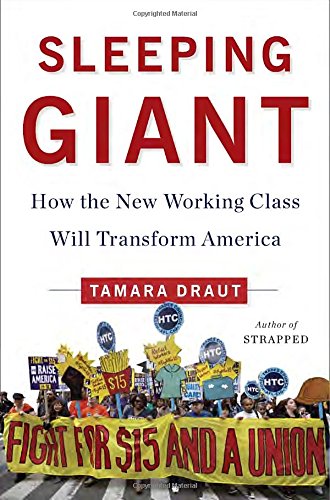
Sleeping Giant
The Untapped Economic and Political Power of America's New Working Class
کتاب های مرتبط
- اطلاعات
- نقد و بررسی
- دیدگاه کاربران
نقد و بررسی

February 8, 2016
Joining the election-year onslaught of political publishing, Draut (Strapped) taps the working class as 2016’s biggest potential transformers. Draut’s definition of the working class is useful—“individuals in the labor force who do not have bachelor’s degrees”—and she uses two other variables, occupation and income, to paint a dire portrait of decline. Today, members of the working class are most likely to work as “retail salespeople, cashiers, food service and prep workers, and janitors,” earning the hourly wage that goes along with such positions. A growing number of working-class people care for the very young and very old, important work often left unprotected by labor laws. Members of the new working class are less likely than in past decades to work in manufacturing—where the work was physically challenging but generally well compensated—and also much less likely to be white and male. Diversity both complicates political organizing and opens a door of opportunity for successful union solidarity and consciousness-raising. The book is unabashedly progressive, growing increasingly political, accusatory, and angry in its later chapters, where it lays claim to the “left flank of the Democratic Party” with a goal of moving “the center of the party back to being the champions of the working class.” Agent: Andrew Stuart, Stuart Agency.

February 1, 2016
A close examination of the plight of the working class, the decline of organized labor's political power, and the stirrings of activism that indicate change may be on the way. Draut (Strapped: Why America's 20- and 30-Somethings Can't Get Ahead, 2006), the vice president of policy and research for Demos, the liberal think tank, pulls no punches in her analysis. Asserting that "the social contract of the New Deal is in tatters" and that "the working class has had a boot on its neck for three decades," she goes on to tell how that came about, who the responsible parties are, what that has meant to American society, and what can be done to create necessary changes. Draut defines working class as anyone in the labor force without a bachelor's degree. Because this group is more diverse--i.e., black, Latino, and female--than in the industrial era, it has been, she writes, easier to ignore. Interviews with workers in "the bargain basement economy" provide a glimpse of their lives, and interviews with assorted activists in such movements as the Fight for $15 and Black Lives Matter show the latest strategies. The Republican Party and the once pro-union Democratic Party come in for some sharp jabs, as do America's cultural elites, its power brokers, and its news- and its policymakers for being too socially distant from the working class to see and understand what has been happening. The middle chapters focus on history, and the closing one, which calls for a "Better Deal," sees a possibly brighter future, the details of which are spelled out in an addendum, "The Blueprint for a Better Deal." Readers who concur that we have a "neoliberal economic system that is systematically rotten to the core" will welcome Draut's impassioned report; others may be unmoved.
COPYRIGHT(2016) Kirkus Reviews, ALL RIGHTS RESERVED.

March 1, 2016
Draut (vice president of policy & research, Demos; Strapped) spends much of this book describing the depressing plight of today's working class, which she says is about to emerge as a powerful force. Central to the service rather than manufacturing sector, the occupations of these workers are scattered across many parts of the economy, including retail, health care, hospitality, and other low-pay, high-turnover businesses. Draut is at her best presenting moving portraits of individuals hopelessly stuck in poorly paid positions with little hope of advancement. Moreover, they are often employed part-time (typically working more than one job at a time) and are isolated from the employer they frequently despise. In most settings, their ability to develop cooperative solutions (such as unionization) has been impeded by the influential companies that have used their profits to marshal political power against potential worker opposition. While the book's title implies a path forward in this environment, Draut's analysis better describes the existing dilemma than offers future outcomes, and in places appears superficial, particularly compared with Victor Tan Chen's Cut Loose, which covers similar topics. VERDICT This decent introduction to the experience of today's common laborers is recommended for general readers but unsatisfactory for those seeking a more sophisticated approach. [See Prepub Alert, 10/19/15.]--Charles K. Piehl, Minnesota State Univ., Mankato
Copyright 2016 Library Journal, LLC Used with permission.

























دیدگاه کاربران